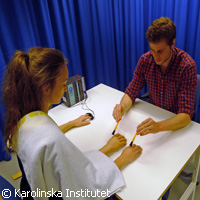Brain believes false third arm is real
Ever wished you had a third arm? Researchers in Sweden have discovered a way of making people believe that they really do have an extra limb. Under controlled laboratory conditions, scientists managed to fool people into thinking a prosthetic arm was actually part of their body. The study, published in the journal PLoS ONE, was funded in part by a European Research Council (ERC) grant under the Seventh Framework Programme (FP7). Brain scientists have long believed that our body image is limited by our innate body plan and that we can only experience having one head, two arms and two legs. However, a team at the Swedish medical university Karolinska Institutet has shown that it is possible to make healthy volunteers experience having three arms at the same time. The researchers asked participants to sit at a table with a realistic prosthetic arm placed next to their right arm. The subjects could see their two real arms and the extra prosthetic arm, made out of rubber. To make them believe that they owned the rubber arm, the scientists touched the subject's right hand and the rubber hand with two small brushes at a corresponding location, synchronising the strokes as perfectly as possible. 'What happens is that a conflict arises in the brain concerning which of the right hands belongs to the participant's body,' explained Arvid Guterstam from Karolinska Institutet's Department of Neuroscience. 'One could expect that only one of the hands is experienced as one's own, presumably the real arm,' he said. 'But what we found, surprisingly, is that the brain solves this conflict by accepting both right hands as part of the body image, and the subjects experience having an extra third arm.' To test the results, the scientists carried out a series of experiments on a total of 154 healthy volunteers, and to prove that the prosthetic arm was truly experienced as a third arm, the scientists 'threatened' either the prosthetic hand or the real hand with a kitchen knife. They then measured the degree of sweating on the palm as a physiological response to this provocation. The results demonstrated that the subjects had the same stress response when the prosthetic hand or the real hand was threatened, but only during the periods when they experienced the third arm illusion. So there was no stress reaction when the prosthetic right arm was replaced with a left arm or a prosthetic foot. 'In four well-controlled experiments, we demonstrated the minimal required conditions for the elicitation of this supernumerary hand illusion,' the authors wrote in the paper. 'In the fifth and final experiment, we showed that the illusion reported here is qualitatively different from the traditional rubber hand illusion as it is characterised by less disownership of the real hand and a stronger feeling of having two right hands,' they add. 'These results suggest that the artificial hand "borrows" some of the multi-sensory processes that represent the real hand, leading to duplication of touch and ownership of two right arms.' The scientists said the study represented 'a major advance because it challenges the traditional view of the gross morphology of the human body as a fundamental constraint on what we can come to experience as our physical self, by showing that the body representation can easily be updated to incorporate an additional limb'. They hope these findings will benefit patients by leading to the creation of new applications in prosthetics research. 'It may be possible in the future to offer a stroke patient, who has become paralysed on one side of the body, a prosthetic arm that can be used and experienced as his own, while the paralysed arm remains within the patient's body image,' said study leader Henrik Ehrsson. 'It is also conceivable that people with demanding work situations could benefit of an extra arm, such as firemen during rescue operations, or paramedics in the field.For more information, please visit: Karolinska Insititutethttp://ki.se/?l=enPLoS ONEhttp://www.plosone.org/home.action
Countries
Sweden



